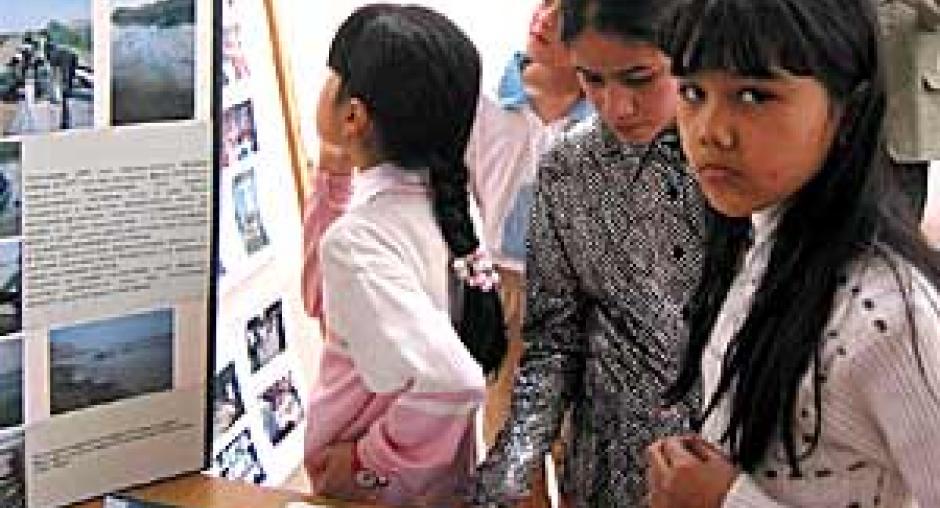Newsroom
OSCE-UN workshop in Dushanbe discusses environmental security
DUSHANBE 18 August 2003

(OSCE)Schoolchildren in Tajikistan are learning about nature protection through OSCE-sponsored summer camps, school competitions and street cleaning, July 2003. (OSCE) Photo details
DUSHANBE, 18 August 2003 - Security-related environmental risks in Central Asia and the main difficulties in addressing them were the focus of a workshop held in the Tajik capital, Dushanbe.
Organized by the OSCE Centre in Dushanbe, the United Nations Development Programme (UNDP) Office in Dushanbe, and the Tajik Ministry of Nature Protection, the event focused on the participation of the general public in environmental decision-making, difficulties of non-governmental organizations in addressing environment and security links, environmental co-operation and gaps between policies and their implementation.
"Potential environmental risks in Central Asia have for the first time been mapped and published for large circulation," said Khatam Murtazaev, director of the non-governmental organization, Ecology and Scientific-Technical Progress, at the workshop. "Tajikistan is a country with one of the largest amounts of radioactive waste in Central Asia. Regular monitoring of the situation and concrete measures are necessary for us to avoid hazardous situations and environment-related conflicts between the countries."
"Only by joining our forces can we solve the national and regional environmental problems," said the Deputy Minister of Nature Protection of Tajikistan, Todjinisso Nosirova.
On top of the event's agenda was to discuss the components of the draft programme for the second phase of the joint OSCE-UN Environment and Security Inititative (ENVSEC) in Tajikistan, which will be conducted over the next three years. The ENVSEC Initiative was launched in September 2002 by the OSCE, UNEP and the United Nations Development Programme.
The Initiative had identified three pillars of activity: vulnerability assessment and monitoring, capacity building and institutional development, and policy development and implementation.
The workshop participants agreed that the first stage of the initiative, assessing the environmental risks in Central Asia, was implemented successfully. They concluded that the second phase meant identifying means and mechanisms to foster co-operation, integrating them into foreign and security thinking as well as policy-making, capacity-developing and institution-building activities.
The event on 15 August was attended by representatives of Tajikistan's parliament, the ministries of Nature Protection, Water Management, Economy and Trade, the Ministry of Security, the International Atomic Energy Agency, Tajik Academy of Sciences, as well as environmental NGOs.
Organized by the OSCE Centre in Dushanbe, the United Nations Development Programme (UNDP) Office in Dushanbe, and the Tajik Ministry of Nature Protection, the event focused on the participation of the general public in environmental decision-making, difficulties of non-governmental organizations in addressing environment and security links, environmental co-operation and gaps between policies and their implementation.
"Potential environmental risks in Central Asia have for the first time been mapped and published for large circulation," said Khatam Murtazaev, director of the non-governmental organization, Ecology and Scientific-Technical Progress, at the workshop. "Tajikistan is a country with one of the largest amounts of radioactive waste in Central Asia. Regular monitoring of the situation and concrete measures are necessary for us to avoid hazardous situations and environment-related conflicts between the countries."
"Only by joining our forces can we solve the national and regional environmental problems," said the Deputy Minister of Nature Protection of Tajikistan, Todjinisso Nosirova.
On top of the event's agenda was to discuss the components of the draft programme for the second phase of the joint OSCE-UN Environment and Security Inititative (ENVSEC) in Tajikistan, which will be conducted over the next three years. The ENVSEC Initiative was launched in September 2002 by the OSCE, UNEP and the United Nations Development Programme.
The Initiative had identified three pillars of activity: vulnerability assessment and monitoring, capacity building and institutional development, and policy development and implementation.
The workshop participants agreed that the first stage of the initiative, assessing the environmental risks in Central Asia, was implemented successfully. They concluded that the second phase meant identifying means and mechanisms to foster co-operation, integrating them into foreign and security thinking as well as policy-making, capacity-developing and institution-building activities.
The event on 15 August was attended by representatives of Tajikistan's parliament, the ministries of Nature Protection, Water Management, Economy and Trade, the Ministry of Security, the International Atomic Energy Agency, Tajik Academy of Sciences, as well as environmental NGOs.
